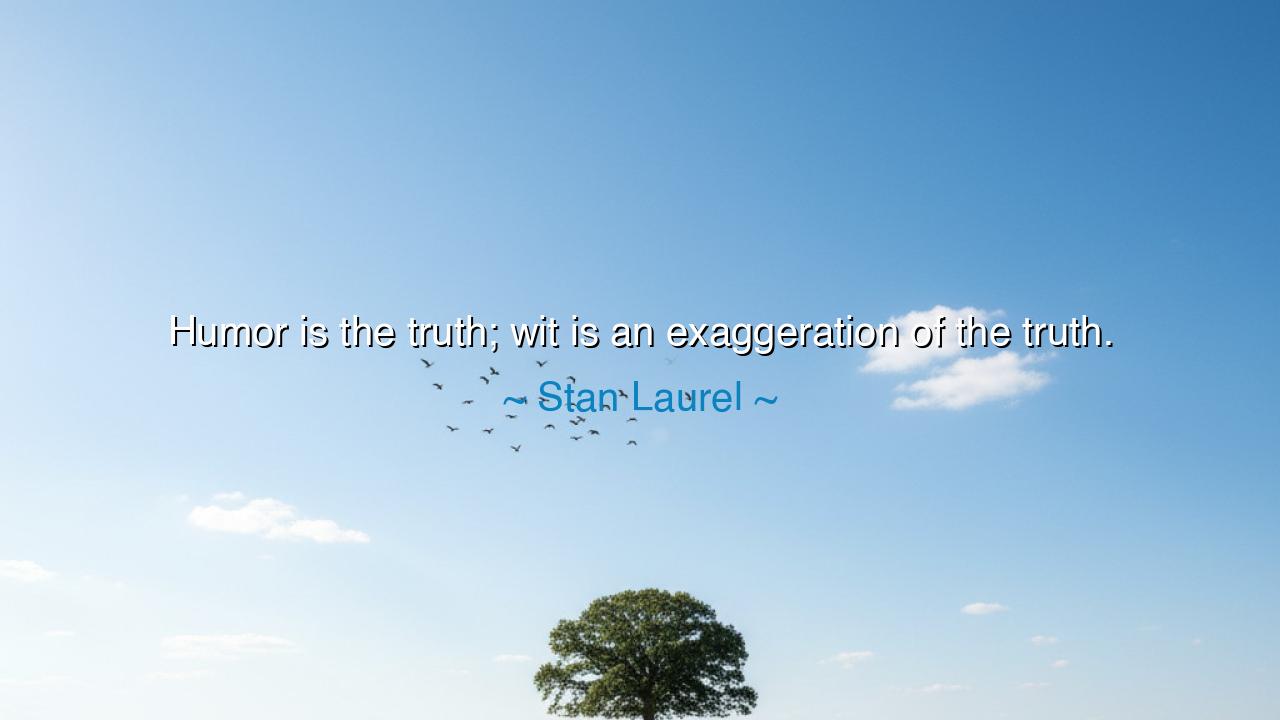
Humor is the truth; wit is an exaggeration of the truth.






When Stan Laurel said, “Humor is the truth; wit is an exaggeration of the truth,” he revealed a wisdom that lies beneath all laughter — that the essence of humor is not fantasy, but truth itself. For only truth, seen clearly and spoken simply, can make the heart both ache and laugh at once. And when that truth is stretched, sharpened, or adorned, it becomes wit — a mirror that bends reality just enough to make us see it anew. Laurel, who spent his life turning everyday follies into art, understood that true laughter does not mock reality — it exposes it, tenderly and without cruelty. His words remind us that behind every joke that endures, there is a truth that matters.
The ancients, too, spoke of such laughter. The philosopher Aristotle once said that humor is “a kind of teaching,” a way of revealing the hidden through the unexpected. Humor, as Laurel teaches, is the truth unadorned — it is the simple recognition of the human condition, the folly, the contradiction, the beauty and absurdity of life as it really is. It is the farmer laughing at the rain, the mother smiling at her child’s mischief, the soldier finding irony in the chaos of battle. Wit, however, is what happens when that truth is refined by intellect, when the mind joins the heart in shaping the raw stone of reality into something bright and cutting. Wit amuses; humor redeems.
Laurel himself embodied this harmony of truth and exaggeration. Alongside Oliver Hardy, he created a world of silent comedy where the smallest truths — pride, clumsiness, vanity, hope — became universal. In one film, Laurel and Hardy try to move a piano up a flight of stairs. They struggle, sweat, and fail, again and again. The scene is absurd, yes, but beneath it lies the truth of every human effort — the endless, laughable struggle of man against the weight of the world. That is humor as truth: the acknowledgment that we all push our own pianos, that we fall, get up, and fall again. And yet, because we can laugh at it, we are never defeated.
But when Laurel exaggerates the moment — when the piano crashes for the third time, or when Hardy’s face contorts in theatrical outrage — truth becomes wit. The exaggeration does not destroy the meaning; it amplifies it. In laughter, we see ourselves, but larger, clearer, almost heroic in our foolishness. This is why wit, though clever, depends upon truth — for without truth, exaggeration becomes nonsense, and laughter loses its soul. As the ancients said, “Excess without essence is vanity,” and so it is with comedy: wit without truth is hollow, but truth, even stretched thin, will always ring clear.
In a deeper sense, Laurel’s wisdom touches upon the very nature of art itself. All creation begins with truth — the observation of what is — and then moves through exaggeration to reveal what could be. The painter’s brush, the poet’s metaphor, the comedian’s joke — all are acts of transformation that begin in reality but reach toward revelation. Humor, in its purest form, is compassion made visible; wit, in its highest form, is truth made radiant. When we laugh at truth, we do not mock it — we embrace it, forgiving ourselves and one another for being human.
Consider, too, the example of Mark Twain, another master of truth and exaggeration. When he said, “The human race has one really effective weapon, and that is laughter,” he echoed Laurel’s spirit. Twain’s humor was always rooted in truth — in the hypocrisy of society, the vanity of politicians, the innocence of fools. But through exaggeration — the tall tale, the absurd metaphor, the sharp twist of phrase — he turned truth into wit that stung and healed at once. His laughter was never shallow; it was the laughter of a man who loved humanity enough to tell it the truth.
The lesson, then, is eternal: seek the truth in your laughter, and do not fear to exaggerate it into joy. Let humor be your honesty — the gentle mirror that reflects the world as it is. Let wit be your imagination — the fire that reshapes that reflection into wisdom. When you laugh, let it not be cruelty or mockery, but understanding. For as Stan Laurel teaches, laughter is not an escape from truth; it is its celebration. Through humor, we find humility; through wit, we find brilliance. Together, they remind us that to laugh at life is to accept it — and to accept it is to live fully, bravely, and beautifully.






AAdministratorAdministrator
Welcome, honored guests. Please leave a comment, we will respond soon